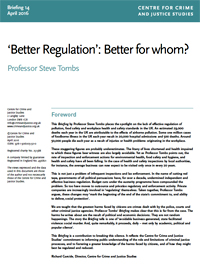This week Professor Tombs made a special presentation of his latest report and updated findings to CWU Regional Health and Safety Forum Officers. Here Dave Joyce, CWU's National Health, Safety & Environment Officer reviews the report, which can be downloaded from this website via a link at the end of this article.
 Writing in a letter to all CWU branches (LTB594/16), Dave goes into detail in describing the report:
Writing in a letter to all CWU branches (LTB594/16), Dave goes into detail in describing the report:
In July this year Professor Steve Tombs published his Report ‘Better Regulation: Better for Whom?’ which puts the spotlight on the Lack of Effective Workplace Health & Safety, Standards and Regulation, Pollution and Food Safety Controls in The UK.
An estimated 29,000 deaths each year in the UK are attributable to the effects of airborne pollution. Some one million cases of foodborne illness in the UK each year result in 20,000 hospital admissions and 500 deaths. Around 50,000 people die each year as a result of injuries or health problems originating in the workplace.
These staggering figures are probably underestimates. The litany of lives shortened and health impaired to which these figures bear witness are also largely avoidable.
Yet as Professor Tombs points out, the rate of inspection and enforcement actions for environmental health, food safety and hygiene, and health and safety have all been falling. In the case of health and safety inspections by local authorities, for instance, the average business can now expect to be visited only once in every 20 years.
This is not just a problem of infrequent inspections and lax enforcement. In the name of cutting red tape, governments of all political persuasions have, for over a decade, undermined independent and effective business regulation. Budget cuts under the austerity programme have compounded the problem. So too have moves to outsource and privatise regulatory and enforcement activity.
 Private companies are increasingly involved in ‘regulating’ themselves. Taken together, Professor Tombs argues, these changes may ‘mark the beginning of the end of the state’s commitment to, and ability to deliver, social protection’.
Private companies are increasingly involved in ‘regulating’ themselves. Taken together, Professor Tombs argues, these changes may ‘mark the beginning of the end of the state’s commitment to, and ability to deliver, social protection’.
We are taught that the greatest harms faced by citizens are crimes dealt with by the police, courts and other criminal justice agencies. Professor Tombs’ Briefing makes clear that this is far from the case.
The harms he writes about are the result of political and economic decisions. They are not random happenings. The story the Briefing tells is one of ‘avoidable business-generated, state facilitated violence: social murder. And, quite remarkably, it proceeds, daily – met only by academic, political and popular silence’.
The Report is a contribution to breaking this silence. It reflects the ‘Centre for Crime and Justice Studies’ commitment to informing public understanding of the role and limitations of criminal justice processes, and to fostering a greater knowledge of the harms faced by citizens, and of how they might best be regulated and reduced.
Regulation these days is widely derided, a dirty word now by the Tory Government, equated with ‘red tape’, unnecessary rules, burdens and bureaucracy. Yet we would do well to recall that regulation of business emerged ostensibly to provide some levels of ‘social protection’ for workers, consumers and communities from the worst excesses of the industrial revolution.
 Thus, the regulatory agencies formed in Victorian Britain created the basis of regulatory regimes through to the present day while social protection through regulation probably reached its high point in the 1970s/80s – early 90’s, then, the emergence of neo-liberalism provided the context for a concerted attack on regulation in the name of freeing business from the burdens of red tape.
Thus, the regulatory agencies formed in Victorian Britain created the basis of regulatory regimes through to the present day while social protection through regulation probably reached its high point in the 1970s/80s – early 90’s, then, the emergence of neo-liberalism provided the context for a concerted attack on regulation in the name of freeing business from the burdens of red tape.
As Steve Tombs’ report sets out, in the past 15 years, virtually without political, public nor academic comment, this ‘social protection state’ has been radically transformed.
Specifically:
● Regulation now proceeds virtually without enforcement, a result of a political initiative, ‘Better Regulation’, rolled out by Labour, Coalition and Conservative Governments.
● The politics of anti-regulation have been overlain by the economics of austerity.
● Austerity has particularly impacted upon regulation and enforcement at the level of local authorities.
● Private businesses are increasingly involved in the business of regulation.
● The agencies of social protection – such as the national Health and Safety Executive or Local Authority Environmental Health Offices – have been radically transformed to the extent that they are either unable to perform their statutory duties, or now perform protection for rather than from business, or both.
Overall, these developments have left workers, consumers and local communities more vulnerable to business-generated harms while exacerbating economic and social inequalities.
A copy of 'Better Regulation: Better for Whom?’ Report by Professor Steve Tombs can be downloaded from the E-Library Database here
Source: CWU


 Writing in a letter to all CWU branches (LTB594/16), Dave goes into detail in describing the report:
Writing in a letter to all CWU branches (LTB594/16), Dave goes into detail in describing the report: Private companies are increasingly involved in ‘regulating’ themselves. Taken together, Professor Tombs argues, these changes may ‘mark the beginning of the end of the state’s commitment to, and ability to deliver, social protection’.
Private companies are increasingly involved in ‘regulating’ themselves. Taken together, Professor Tombs argues, these changes may ‘mark the beginning of the end of the state’s commitment to, and ability to deliver, social protection’. 